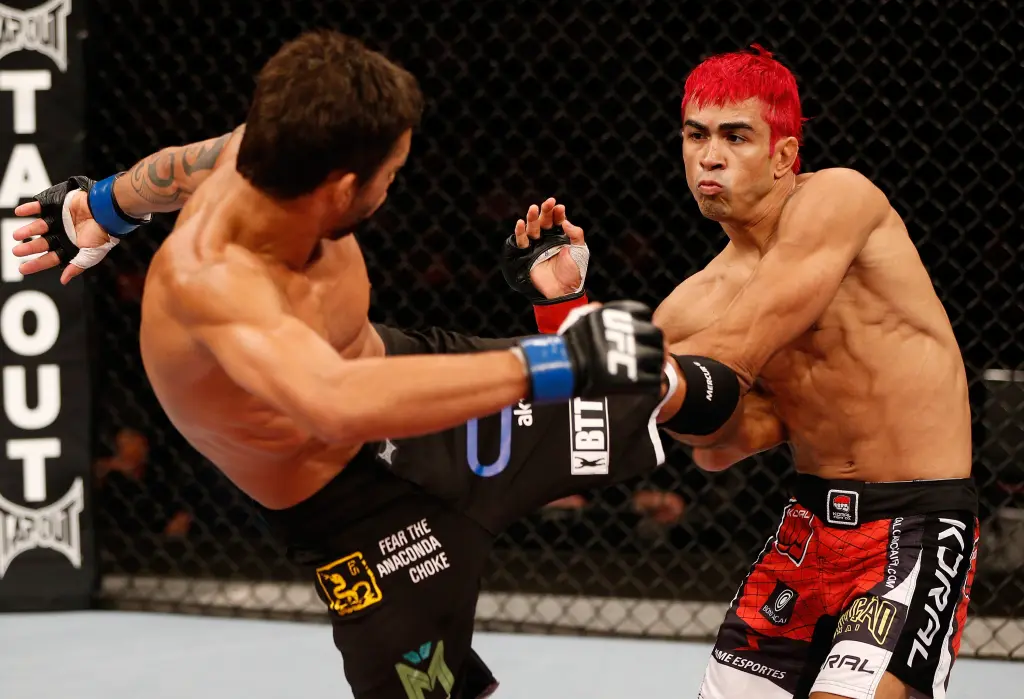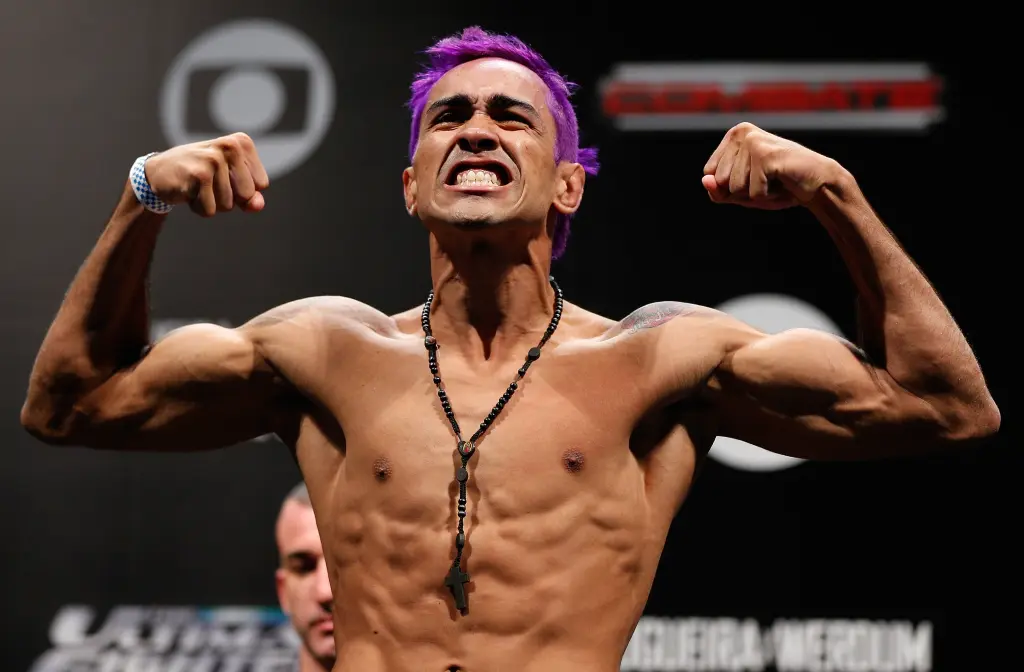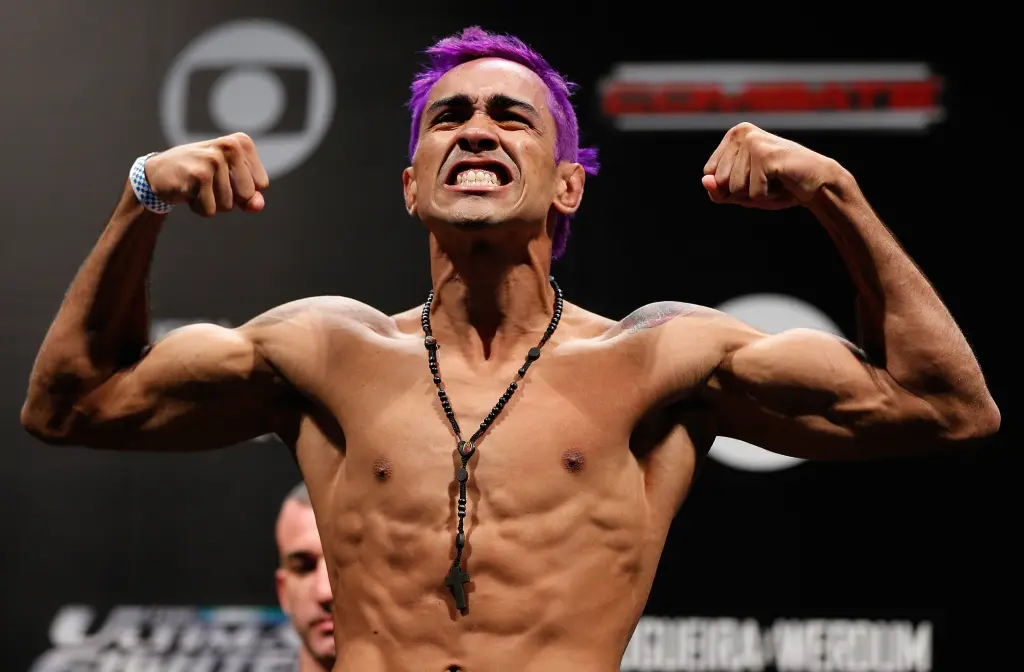Former UFC Star Godofredo “Pepey” Castro Found Dead in Florida Jail at 38 — Months After Arrest on Domestic Violence and Kidnapping Charges
The mixed martial arts community is reeling after the shocking death of former UFC featherweight fighter Godofredo “Pepey” Castro, who was found dead inside a Florida jail cell over the weekend. The 38-year-old Brazilian athlete, known for his flamboyant fighting style and brightly colored hair, reportedly died by apparent suicide while in custody at the Broward Sheriff’s Office main jail in Fort Lauderdale.

According to official reports released by the sheriff’s office, deputies discovered Castro unresponsive in his cell during routine rounds at approximately 8 p.m. Despite immediate attempts at life-saving measures by jail medical staff and emergency responders, he was pronounced dead shortly after being transported to a nearby hospital. Authorities have not yet released further details pending an official autopsy, though early indications point to suicide.
Castro’s death brings a tragic and deeply complicated end to a life that once symbolized athletic promise and charisma but had lately become mired in controversy and legal trouble. In June, he was arrested on charges related to domestic violence — including kidnapping and strangulation — following an alleged assault on his wife during what police described as a violent altercation fueled by jealousy.
According to court records reviewed by multiple news outlets, Castro had been held in custody since June 30, unable to post bond after prosecutors argued that the charges carried a high risk of harm and required strict detainment. The police report alleged that Castro’s wife suffered visible injuries during the attack and that she told officers the former fighter had accused her of infidelity before physically assaulting her and preventing her from leaving their home.
The allegations marked a steep fall for a man once celebrated for his electrifying presence inside the octagon. Born in Fortaleza, Brazil, Godofredo Castro — nicknamed “Pepey” — first rose to prominence in 2012 when he appeared on The Ultimate Fighter: Brazil, the popular reality competition that launched the careers of several major UFC names. His mix of athleticism and showmanship quickly made him a fan favorite. Known for his wild entrances, colorful hair, and unpredictable fight style, Castro embodied the kind of personality that stood out in the sport’s intensely competitive featherweight division.

He went on to compete in the UFC between 2012 and 2017, compiling a professional record that included memorable victories over fighters like Sam Sicilia and Mike de la Torre. His high-flying attacks and grappling flair earned him multiple post-fight bonuses, including “Performance of the Night” honors for his submission win over De la Torre at UFC Fight Night 62.
But after a string of losses, Castro was released from the UFC in 2017. He continued to fight sporadically in regional promotions, both in Brazil and internationally, but never recaptured the spotlight that once surrounded him. Over the following years, he appeared to struggle both professionally and personally, according to friends and former training partners.
News of his death spread quickly among former colleagues and fans, many of whom expressed sorrow while acknowledging the troubling circumstances that defined his final months. “It’s heartbreaking,” one former teammate told MMA Fighting. “Pepey was always full of energy — one of those guys who could make everyone in the gym laugh. But you could tell he had demons.”
The Broward Sheriff’s Office has stated that its Department of Professional Standards will conduct an internal investigation into Castro’s death, as is standard procedure for any in-custody fatality. Meanwhile, the Medical Examiner’s Office will perform a full autopsy to confirm the cause of death and rule out foul play.
Castro’s attorney, who had been representing him in his domestic violence case, released a brief statement calling the news “devastating.” “We were hopeful about working toward a fair legal process for Mr. Castro,” the attorney said. “This is a tragic ending to a life that had both great potential and deep pain.”
The domestic violence case had already drawn attention from MMA outlets in Brazil earlier this year after local police released details of the charges. Castro’s wife, whose identity has been withheld for privacy reasons, alleged that the fighter had become increasingly controlling and paranoid in the weeks leading up to the attack. In her statement to police, she claimed he had strangled her during a heated argument and locked her inside their home, preventing her from escaping until she was able to call for help.
The incident was reportedly one of several altercations between the couple, though it was the first time Castro faced formal criminal charges in the United States. Brazilian media outlets covering the case described his arrest as a “national shock,” given his once-strong public image and the passionate fanbase that followed him from his UFC debut through his years on Brazil’s regional MMA circuit.
Following his arrest, Castro’s social media accounts fell silent. Before that, his posts had alternated between motivational training messages and cryptic reflections about personal struggles. Some fans now point to those posts — particularly one from early June in which he wrote about “fighting battles outside the cage” — as a haunting glimpse into his mindset in the weeks leading up to his arrest.
Mental health has become an increasingly urgent topic within the combat sports community, where fighters often face intense physical strain, public scrutiny, and financial instability after their careers wind down. While the UFC and other major promotions have introduced wellness programs in recent years, many athletes who leave the organization struggle to find the same support once they are out of the spotlight.
“Fighters spend years being told to be invincible,” said sports psychologist Dr. Daniel Kaufman, who works with retired athletes. “When their careers fade or when they face personal crises, many don’t have the tools to cope. The combination of fame, adrenaline, and sudden isolation can be devastating.”
For some in the MMA world, Castro’s story has reignited discussions about how former fighters can be better supported after leaving the sport. Several of his contemporaries have since spoken out on social media, urging others to reach out if they are struggling with mental health or domestic issues. “We’ve lost too many,” one Brazilian fighter wrote. “This has to be a wake-up call.”
Still, for others, the conversation remains complicated. Castro’s death comes just months after serious allegations of domestic violence — a fact that cannot be separated from the grief surrounding his passing. Victim advocacy groups have pointed out that while suicide is a tragedy, it should not eclipse the harm caused by abuse or the importance of accountability. “It’s possible to mourn a life lost while also recognizing the suffering of others,” one spokesperson for a Florida-based domestic violence prevention organization said.
The Broward Sheriff’s Office has not indicated any negligence or wrongdoing within the jail facility but confirmed that it is reviewing all security footage and conducting interviews with staff. Early reports suggest Castro had not been on suicide watch at the time of his death, though it is unclear whether he had previously shown signs of mental distress.
As details continue to emerge, the MMA community has been left grappling with mixed emotions — sorrow, anger, and reflection. Castro’s death underscores the intersection of fame, violence, and mental health that continues to haunt the fight world. For those who watched him rise through the ranks of Brazilian MMA to the bright lights of the UFC, it’s a painful reminder of how quickly glory can unravel.
“Pepey was one of a kind,” said a former coach from his Fortaleza training camp. “He came from nothing, and he made people believe he could be a champion. Somewhere along the way, he lost that light. I wish someone could have reached him before it was too late.”
As investigations continue, one thing remains clear: Godofredo “Pepey” Castro’s legacy — both in the cage and out of it — will be remembered as one of promise, complexity, and tragedy.


